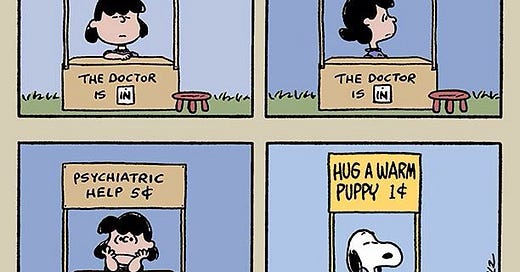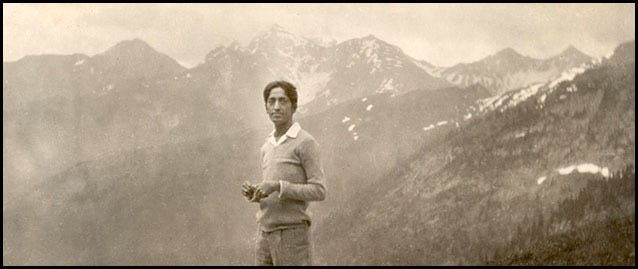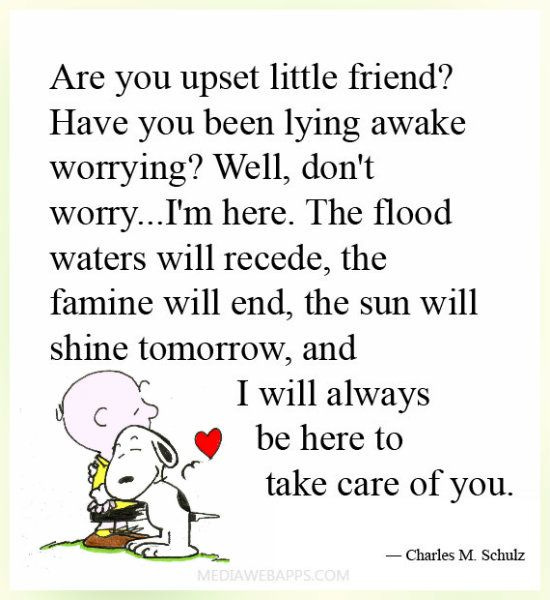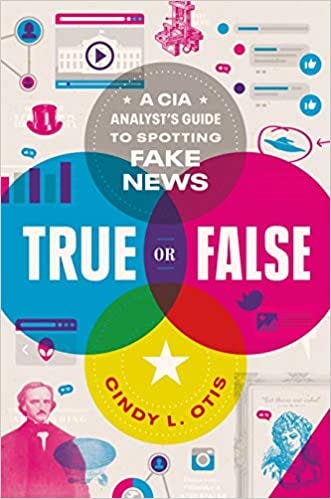In 1970, as part of his effort to publicize the need for low-cost counseling, psychiatrist and “lifelong armchair philosopher” Dr. Benjamin Weininger had a booth built on a sidewalk in Los Angeles, offering 5 cent therapy to pedestrians passing by.
Weininger was inspired by Lucy’s famous 5¢ psychiatry booth in Charles Schulz’s beloved cartoon Peanuts.
“If everyone could go to someone to talk to an interested silent listener or a counselor for five cents, we would have a better world to live in.” - Charles Schulz
Now offering 5 cent therapy on the sidewalk could prove to be problematic if it was doled out by just anyone, but Benjamin Weininger had some credentials.
Dr. Weininger was “a leader in movements seeking to use religion and eastern philosophies in psychoanalysis. In the 1960s, he helped pioneer "open door" clinics for youths with drug-related problems. Until shortly before his death, he worked with Vietnam War veterans at the Veterans Administration Center in Santa Barbara.”
Along these lines, Dr. Ben, as he was often called, had a friendship and a professional relationship with legendary teacher Jiddu Krishnamurti.
Dr. Ben introduced Krishnamurti to the psychoanalytic community and fostered a dialogue that helped both parties in their mission to liberate others from their psychological troubles.
Though one might think of Krishnamurti as above the need of psychotherapeutic help himself, Dr. Ben saw his human side and his ability to transcend neurosis by allowing so-called negative emotions to arise and dissipate without resistance.
Weininger explained what happened upon introducing Krishnamurti for the first time to the psychoanalytic community.
I have seen Krishnamurti fearful and I think it’s an important thing to describe the circumstances under which it happened. When he was talking to the psychiatrists and psychoanalysts for the first time in Washington, D.C., he came to me and he was shaking with fear. He said, “I’m scared.” And I tried to reassure him that it would be alright, and then when he went in to the talk, I realized that he was able to drop the fear. He allowed himself to experience the fear fully and then let it go. Most of us don’t do that, we stay with the fears instead of letting it go. This is what he means when he says, I have no fear. I also asked him, “Would you be afraid if you were dying?” and he said, “I don’t know. I would have to see, I would have to be aware to see whether I was afraid.”
Through their interaction Dr. Weininger moved from a more Freudian-based way of teaching to one that allowed for a more philosophical influence.
The change was partly that I was having more of a relationship with the person, the patient. I was not so impersonal and I didn’t hesitate to talk about my philosophy and share it with the patients.
This philosophical element came in part from the confrontation between Krishnamurti and the psychoanalytic community on the role of time and the immediacy and intensity of desire for change in therapy.
While the traditional model was to anticipate slower rates of change over longer periods of time, Krishnamurti questioned whether that had to be the case.
The key to self-understanding in psychoanalysis is based on the revealing of past history and Krishnamurti makes a very important point—a slightly different point. The key, as he sees it, is to be aware of your reactions. Usually your images of the way things should be are constantly being threatened, and when your image is threatened in any area, you react and sometimes you react with anger or hurt and those reactions are always from your past. So you can get at your past by understanding your reactions rather than digging into the past history.
While he was working on these insights into the nature of analytic counseling and hosting conferences in association with high profile people like Krishnamurti, it was Dr. Ben’s dedication to low-cost counseling that may have better defined his legacy.
In the booth Dr. Ben set up in front of his Southern California Counseling Center, he had visitors ranging in age from 9 to late 70’s.
In both the counseling center and in the booth he often performed what he called “brief therapy.”
Brief therapy was focused on addressing one singular problem. Dr. Ben would take off his watch, and with complete, unhurried attention discuss the problem presented and any associations related to the problem.
“When I do brief therapy, first I put my watch in my pocket and my body becomes an ear,” he said.
He noted how this approach “arouses greater intensity in the patient, and frequently a breakthrough in one area of life is made.”
In 1979, Dr. Ben released a book of his aphorisms titled Why Salt the Peanuts? Sayings of the 5¢ Psychiatrist. (Not to be confused with the psychiatrist 50 Cent).
While the aphorisms didn’t come word-for-word from his work in the counseling booth, they were offered as a way to compress the combined experience and wisdom gained from these sessions.
I’ve included a small sampling of aphorisms from the book below, though almost every page has something worthy of being highlighted:
Have every emotion. Hang onto none.
Compromise without resentment is the key to living together.
We don’t know what we should really be worrying about, so why worry?
Indecision is a form of dependency. You are waiting for somebody to give you an answer.
Pay attention to your friend’s feelings. It is a cure for self-centeredness.
Ailments are inverted anxiety.
The most commonly used and the least effective escape from the pain of conflict in a relationship is the attempt to change your partner.
If marriages were tentative, they would last longer.
Anger is one way of getting control when you are afraid of being vulnerable, but to allow yourself to be vulnerable opens the way to affection and tenderness.
One of the functions of marriage is to start growing again at the point where you left off as a child.
The secret of aging is to be more and more content with less and less.
An Hasidic sage always carried two notes in his pocket. One read ‘For me alone was this universe created.’ The other ‘Dust and ashes are Thou.’
There are two I’s. The small i (ego) can be described; the eternal I is unique and cannot be described.
A person of high intelligence often doesn’t find the right work for (him or her) self until they are older.
In the future more people will create and invent their own work by pursuing what interests them. Why wait?
“I am not afraid of dying at all,” Dr. Ben said in his 1979 book entitled “Aging Is a Lifelong Affair.”
When he died in 1988 he left behind an expanded idea of what counseling can be and a direct example of how it can and should be offered to all of those in need, not only those with the luxury to afford it.
I think it’s appropriate to close with some words from Charles Schulz about what it means to have someone there for you in times of trouble. Words I think Dr. Weininger would’ve agreed with.
Navigating the Negative News Cycle
“True or False: A CIA Analyst's Guide to Spotting Fake News,” is a young adult nonfiction book that gives readers tips on how to avoid falling victim to fake news.
According to School Library Journal, “Former CIA analyst Otis has written a necessary and engaging resource that should be required reading for all high school students.”
The book is useful for adults as well. One of the hazards of media consumption of any type is the onslaught of negative news, which is why I took note when I first ran across Cindy Otis in a 2018 tweet with tips gleaned from her experience in this area.

I’ve reproduced the text of the tweet thread below, for those who prefer a non-Twitter reading experience.
What was particularly helpful for me is that in the past I’ve had an inclination to ignoring the news and politics altogether (and in fact did entirely for awhile), while simultaneously knowing it would be helpful in my work to have more exposure to current events, without wanting to deal with the negative residue of it.
The framing of the problem as well as the tips below are extremely helpful for navigating that terrain.
Today seems like the right time to do a thread I've been thinking about for a while on how to handle the seemingly never-ending deluge of depressing and disturbing news. My tips are based on my time as a CIA military analyst in which I dealt daily with disturbing content.
There are several risks to being overloaded with disturbing/negative content.
Complacency - becoming so used to the deluge that it all starts to seem normal.
Paralysis - that is, being so overwhelmed, you can't figure out what to do/how to move forward.
Crisis perspective - you get trapped in the Breaking News cycle where everything seems like a potentially world-ending crisis to you.
Depression/PTSD - you don't have to be on the frontline of a war have either/both. Disturbing content is absolutely a trigger.
There are also serious physical consequences to living a negative content overloaded life. I had a colleague who didn't know he had stage 4 brain cancer because the symptoms were the same as our very stressful careers--exhaustion, random fevers, stress, and dizziness.
The Tips:
So, what do you do?
First, I strongly urge you not to ignore the news/current events. Ignorance is one reason we have this society. It won't make the problems go away & contributes nothing to their solving. Now that that's established, here's how to make it easier to handle:
1. TAKE ACTION. Volunteer for a food pantry, canvass for a political candidate, donate to a NGO, visit a sick friend. Seriously. Service of some kind in your community lets you be part of SOLUTIONS. You will see RESULTS when otherwise you'd feel helpless.
2. Conversely, for those who may take tip #1 to the extreme--know that you alone can't save the world. Accept your limits. You aren't a 7/11. You can't always be open. At the end of every day when I reached my limit, I silently told myself, "I've done what I can today."
(Note: Repeating that to myself did not stop me from feeling like I could have done more most days. But it was important to tell myself anyway because I am human. We are human. It's good we *feel* things.)
3. RESEARCH BEFORE PANICKING. Easier said than done, but everything will seem like crisis/earth-ending if you don’t know what has/hasn't happened before. If it has happened before, it's can be hugely comforting to know how it was resolved and/or what might happen next.
4. GET UP & MOVE. Put the phone away, turn off the TV, log out of Twitter. Go for a walk, sit outside, get some coffee, call a friend. CIA is full of ppl walking the building with a colleague/friend. There's a reason. Our brains & bodies need breaks from stressful content.
5. SET RULES. Because of my work at CIA, I had a rule--I only read fiction at home. I had enough reality at work. In the civilian world, I set blocks of time each day where I turn everything off--no news or social media. Let yourself recharge so you can keep fighting later.
6. AVOID DARK HOLES. (I'm sure there's a joke to be made about that.) It's easy to get sucked into the swirl of bad news. You watch a gruesome YouTube video and the next one is all queued up to play right after it. Focus on one issue at a time. Deal w/ it before moving on.
7. YOU NEED FUN. When there is suffering, war, despair, etc. around you, it's easy to feel guilty when you have fun, feel happy, have a good meal with friends. You NEED these things. You will be better able to do good in the world if you let yourself have these things.
8. TALK TO SOMEONE. Often, we curl inward socially when overwhelmed w/ negative content. It's a means of protection. One of the great things at CIA was that everyone else knew what you were going through. Whether it's therapy or talking to your person, talking helps.
None of this is easy. I got burned out a lot in my career & many days recently, I've felt overloaded by the barrage. I'm sure you have too. But you and I can't check out. We can't give up & we need to stay engaged, but we can't do that if we get overloaded. Keep going.
Additional Tools, Ideas, & Cool Things:
📏 100 (Short) Rules for a Better Life (from Ryan Holiday)
🏗️ Should we tie minimum wage to local rent? (from the Noahpinion newsletter)
🔭 Quick tool for perspective shifts (via Catherine Andrew’s Sunday Soother)








